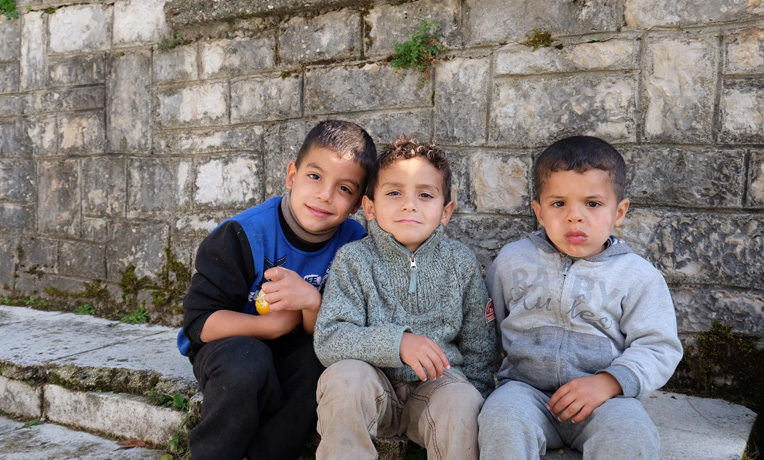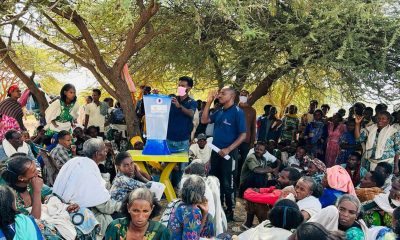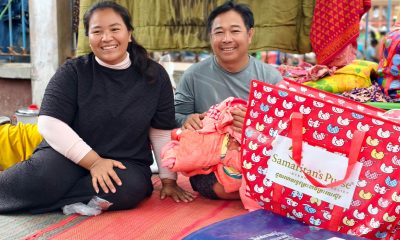Samaritan's Purse is restoring dignity and providing hope to those who have been forced to flee their homes.
We are all new to this type of crisis.
It’s a mass emigration of a people so vast that it has become the largest humanitarian crisis since WWII. If all forcibly displaced people were grouped, they would be the 21st largest country in the world!
We have entered into the unknown and live in it daily.
Like a tide ever turning, the refugee crisis is an ever-changing series of events, policies, agreements, procedures, services, and struggles.
The Syrian conflict first began on March 15, 2011. By May that same year, 5,000 refugees had fled into Lebanon due to harsh fighting in Syria.
The crisis entered the EU in 2015 and Europe awoke to pay attention, naming this the European Refugee Crisis.
Entering in by the Mediterranean Sea or through southeast Europe, refugees traveled mostly on foot with dreams of finding better futures for themselves and their families in countries such as Germany, France, Sweden, and the U.K.
Samaritan’s Purse first responded in September 2015.
Operating in Serbia, Croatia, Hungary, Slovenia, Slovakia, and Greece, Samaritan’s Purse worked to meet the physical and spiritual needs of refugees—through the provision of food, blankets, sleeping mats, hygiene items, and other basic necessities—from first landing on the shores of the Aegean Islands throughout their long, arduous journey across Europe.
Along the way, we saw blue and red Samaritan’s Purse backpacks standing out among the crowds walking. Sometimes we were greeted with a smile, a wave, or a sincere thanks when they recognized our logo, as they had encountered and been assisted by Samaritan’s Purse more than once along their journey.

Leda, a Greek national staff member, reunited in a refugee camp in Athens with a friend she met on one of the Greek islands last year
The turning point for refugees and the situation in Europe came on March 20, 2016.
Borders shut.
People were stuck.
The EU-Turkey deal meant a one-in-one-out policy. Syrian refugees arriving after March 20 could be deported back to Turkey.
Arrivals of refugees to the Aegean Islands slowed, and refugees felt stranded in Greece with diminished hopes for better futures or reunification with family living in other parts of Europe.
The relief of the Greek islands’ refugee registration centers now turned into the anxiety of the detention centers.
A place of sanctuary turned to standstill and despair.
Long and lengthy applications processes stretched on as people waited, first to be granted permission to remain in Greece, and then for potential interviews for relocations or deportation.
Suddenly, the needs of the people had changed.
Future plans were halted, situations were seemingly unmoving and restricted, and living conditions were squalid. Hope began to dwindle for many refugees, and we began to see much discouragement in individuals and groups.
It’s now November 2016, and many refugees have been in Greece for several months, living in a state of constant unknown. Some still try to leave.
Hassan, who lives in and helps oversee an informal refugee site in Athens, told me that he recently tried to escape Greece, getting as far as Italy, but was detained at the port and returned back to Greece. He says he will continue to try in order to reach his brother in Germany.
The situation has turned from crisis response to long-term aid and support.
This is the complex context Samaritan’s Purse works in to meet the ever-changing needs of refugees in Greece.
With a team of around 250 staff and volunteers, Samaritan’s Purse is at work in seven key locations in Greece.
Each location is unique. The needs of people, living situations, and even nationalities are different in each area.
In the dozens of camps across Greece, daily our work is about restoring dignity and bringing hope. Our primary focus has been on improving living conditions and camp infrastructure and making sure they are weather suitable and that people have access to basic necessities such as water and food.
Winter is coming.
Already there has been heavy rainfall causing damage to tents and shelters. We are expecting low temperatures, a high snowfall season, and cloudy and strong winds. December is predicted to be the wettest month in Greece. Winterization has begun.
On Samos, we are concentrating on construction—with a great team working to provide shading and seating (especially for the medical area), fixing air conditioning units/heaters, and personally hand-making and installing benches and rubbish bins.
On Chios, we are the primary cleaning crew for Souda camp, improving hygiene and cleanliness and making sure there is safe drinking water available.
On Lesbos, we are focused on water and sanitation. Our team in Moria is working continually to improve facilities such as showers, toilets, and drainage issues.
On Leros, distribution is important, and we daily provide and replace necessary items such as toiletries, hygiene, and baby products for refugees. Additionally, our distribution teams are making sure that all new arrivals are met with a Samaritan’s Purse backpack, including sleeping bag, blanket, and toiletries.
On Kos, among other things, our soccer program has begun, which has seen a transformation in the lives and attitudes of the unaccompanied minors participating. Moving forward, we are working to implement soccer programs on other islands too.
The challenges faced in Greece by refugees and those working alongside them can sometimes change daily. Our response is always adapting, moving, and evolving to be in line with the need.
Refugees coming to Europe from Syria, Afghanistan, Iraq, and other places are daily faced with the new. Forced to flee their homes, they have entered into cultures and attitudes of a new place and a new people.
Their circumstances have given them a label: refugee. Most have left family and friends behind, experiencing loss on a grandiose level.
For some, Europe has brought freedom from religious oppression and the torment of war. Some are still searching for a new life, unsure of what it is they’re looking for.
In this time, where everything is complex and feels unknown, we have been given an exceptionally unique opportunity to welcome people into a new life.
Each day gives rise to new opportunities to love and serve people who would otherwise be unreached, to show compassion, and to bring hope and dignity. God is making all things new, and this truth is what we lean into as we serve people who are desperately searching for new lives.









